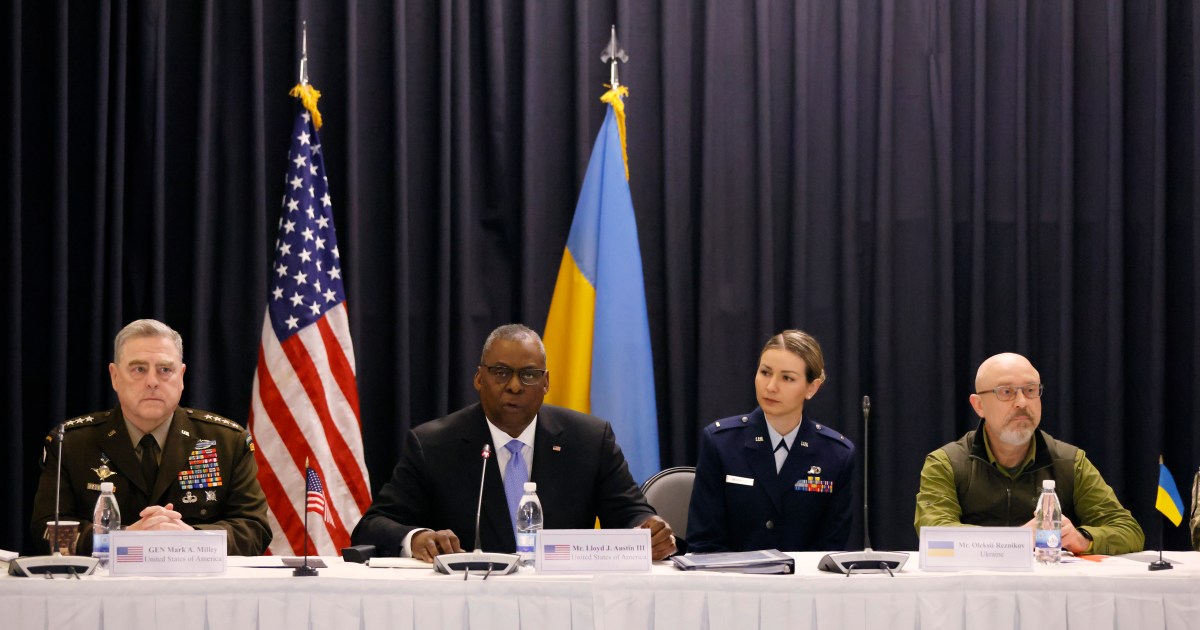Germany decided to supply Ukraine with anti-aircraft weapons for the first time, as Western powers pledged to boost shipments of heavy weapons to Kyiv, and in the meantime, there were fears of a flare-up in neighboring Moldova following explosions in a pro-Russian separatist region.
At a meeting at the German air base of Ramstein on Tuesday, Western military officials discussed coordinating efforts to send heavy weapons to Ukraine, despite Moscow's warnings to them that their support for Kiev could lead to nuclear war.
"Countries from around the world stand united in their determination to support Ukraine in its fight against Russia's imperialist aggression," said US Defense Secretary Lloyd Austin, and welcomed officials from more than 40 countries at Ramstein Base in Germany, the headquarters of the US Air Force in Europe.
In a remarkable transformation, Germany - whose government was subjected to internal and external pressures after rejecting Ukraine's pleas for heavy weapons - announced that it would send Gepard light tanks equipped with anti-aircraft guns.
"The real significance of this decision lies not in the difference that Gibbard tanks can make on the battlefield, but in the signal they send," said Marcel Dersus, a researcher at the Institute for Security Policy at Kiel University.
NATO members recently agreed to support Ukraine with hundreds of millions of dollars in arms shipments, including artillery and drones, that they had held back in earlier stages of the war, and want their allies to do the same. .
Germany also announced - which is the largest consumer of Russian fuels - that it is looking to exclude Russian oil from its supplies within days.
Russian warning
Meanwhile, the Secretary-General of the Russian National Security Council, Nikolai Patrushev, who is described as having a wide influence in Russia and close to President Vladimir Putin, warned that Washington's policies and its "Kyiv regime" could lead to the collapse of Ukraine and its division into several countries.
Patrushev indicated - in an interview with a Russian government newspaper - that the number of Ukrainian refugees in Europe may reach 10 million people, which threatens the continent with political and economic crises, including high inflation rates and a low level of income for Europeans, he said.
For his part, Russian Foreign Minister Sergei Lavrov said during a press conference in Moscow on Tuesday with United Nations Secretary-General Antonio Guterres, that there is no need for mediation with Ukraine, because the dialogue with it is already underway.
At the same time, Lavrov announced his country's support for the United Nations initiative to hold a dialogue, noting that Moscow provides humanitarian aid to Ukraine in coordination with United Nations institutions.
Guterres, for his part, expressed concern about reports of "possible war crimes" in Ukraine, and said an independent investigation was required.
After his meeting with Lavrov, he added that the Russian intervention in Ukraine violated the foundations of the United Nations, and suggested the formation of a humanitarian contact group, and said that the United Nations was ready to play a role in saving lives in the Ukrainian city of Mariupol, which Russian forces declared control over, with the exception of an industrial complex in which Ukrainian forces are holed up.
Developments in Moldova
Meanwhile, there are fears that the war will spread to Moldova, in western Ukraine, where Russian forces have controlled the breakaway region of Transnistria on the Ukrainian border since the 1990s.
Two explosions occurred in the area early on Tuesday, destroying two Soviet-era radio towers, following other explosions in the area on Monday.
The Kremlin expressed concern about these developments, and the separatist authorities in Transnistria said their investigations into what they described as terrorist attacks indicated Ukraine's involvement.
On the other hand, Moldovan President Maya Sandu blamed "factions from within Transnistria that are pro-war and interested in destabilizing the situation in the region" for the "attempts to escalate."
In the same context, the Ukrainian General Staff said that Russian forces are "on full alert" in the Transnistrian region of the Republic of Moldova.

